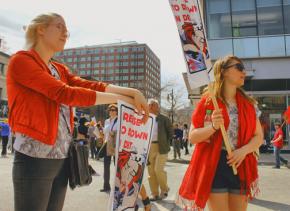Quebec teaches another lesson
British socialist , author of American Insurgents: A Brief History of American Anti-Imperialism, analyzes the election results in Quebec and their meaning for the student movement, in this article written for Britain's Guardian website.
SO THIS is how it's done. Students in Quebec, in rebellion against their government over tuition fees, have scored an amazing victory in the province's general elections.
The former Liberal government, led by Premier Jean Charest, which ran on a law-and-order platform against the students, has been defeated. Its plans to implement an 82 percent tuition fee increase are shredded for now, and the harsh emergency legislation it passed to quell the upsurge is history. Charest is resigning from politics. Two members of the left-wing Québec Solidaire have been elected after the party gained more than 6 percent of the popular vote.
For those used to student movements that erupt suddenly only to deflate within a few weeks or months, this defies belief. How, then, was such an effective action actually sustained, in defiance of police crackdowns and emergency legislation?
Students in Quebec inhabit militant traditions inherited from the "quiet revolution" of the 1960s, when the province's francophone majority pushed for full access to higher education as part of a series of sweeping reforms. This inaugurated a student movement, whose signature was the mass student strike. Each time a government attempted to drive up tuition fees, the students walked out--and most of the time, they won.

As a result, there is a thriving democratic culture among Quebec's students. While British National Union of Students is converting itself into a tame lobbying organization, Quebec students have a tradition of grassroots mobilization and four relatively democratic federal organizations that rank-and-file student bodies can affiliate with.
THE RADICAL spearhead of the movement is the Coalition large de l'association pour une solidarité syndicale étudiante (Coalition of the Association for Student Union Solidarity, known as CLASSE). Emerging from a decade of left-wing student unionism, CLASSE was formed in December 2011 to build a students' strike to stop the fees increase. Going further than most student bodies, it demanded the cancellation of all tuition fees, to be paid for by a tax on banks. This stance was very popular, and the group eventually incorporated 65 local affiliates and 100,000 members, comprising the most politicized and activist core of the province's 400,000-strong student body.
General assemblies of students were held across Quebec, to discuss and implement a strike. This meant boycotting and picketing classes, and at their height, the strikes achieved the support of 300,000 students. The structures of direct democracy built on campuses sustained the momentum behind the strikes, enabling students to meet, discuss and make decisions on a regular basis. Each month, the movement called a mass mobilization, with tens of thousands of students gathering in the Place du Canada in Montreal.
But there was also a heated debate over the strategy and goals of the movement. It wasn't enough to keep the momentum going. In addition to the strikes, radical students sought to disrupt the smooth functioning of the economy and the government, carrying out blockades and occupations of banks and government buildings.
Students also reached out to the labor movement. Theirs was a class issue, they insisted, and CLASSE called for a "social strike" of both students and workers. They consciously sought alliances with Rio Tinto workers locked out of their jobs, public-sector workers facing cuts, campaigns against increased fees for health care, and local resistance to the government's attempts to turn over Northern resources to the mining industry. Neighborhood protests became a regular occurrence. A number of union federations passed motions for strike action, though as yet, the resistance from union leaders is too strong, and the labor militants too weak, to make it happen.
Importantly, the student leadership refused to be divided. When the government excluded CLASSE from negotiations, in the hope of engaging the more moderate student federations in a compromise, the latter walked out.
The government's biggest mistake was passing Bill 78, imposing severe restrictions on the right of students to protest. Though supported by the Quebec Council of Employers, the bill was otherwise reviled. Rather than breaking the students, the repression produced a much wider movement.
Up to half a million people marched in clear defiance of the law. Those returning home from law-breaking protests were greeted by families banging pots and pans in support, from their windows and in the streets. Some of the country's largest trade unions joined in the protest. To get a sense of how improbable this is, compare it with our student protests beginning in November 2010, where the NUS and UCU leaderships organized timid demonstrations separate from the main protests.
The Liberals' defeat can be traced to that defiance. But the Parti Québécois, which has just won, is not an ally of the movement. The new government will probably seek to negotiate a smaller fees increase with the agreement of the less militant student bodies. At any rate, the movement has long been about more than fees. CLASSE intends to keep the pressure on, with new assemblies and protests, aiming to build the widest possible movement to challenge neoliberalism. British students should take the hint.
First published at the Guardian.


